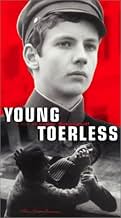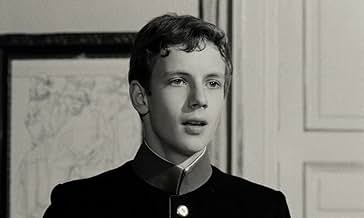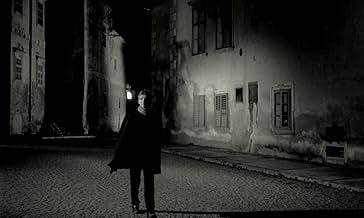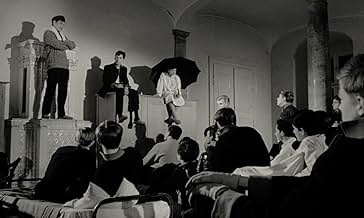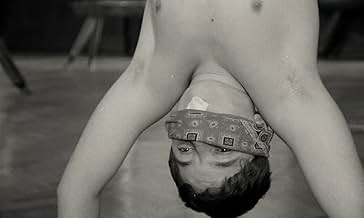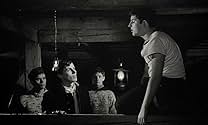PUNTUACIÓN EN IMDb
7,2/10
2,8 mil
TU PUNTUACIÓN
Añade un argumento en tu idiomaIn a boarding school, a student observes in passive disgust as his two friends manipulate, humiliate and torture a fellow student, justifying their every act.In a boarding school, a student observes in passive disgust as his two friends manipulate, humiliate and torture a fellow student, justifying their every act.In a boarding school, a student observes in passive disgust as his two friends manipulate, humiliate and torture a fellow student, justifying their every act.
- Dirección
- Guión
- Reparto principal
- Premios
- 4 premios y 1 nominación en total
Reseñas destacadas
Considered a classic film as it was the first film to put the then New German Film firmly on the (international) map. Also a classic because it was Schlöndorf's first feature and it is still thought highly of. To be sure, this is a beautiful film to watch with its superb black-and-white cinematography; Schlondörf's direction makes it into a well paced and staged, stylish film. But I never liked the film; recent re-viewing confirmed my feelings.
Schlöndorf wants to do more than simply bring the viewer the subject and with that the whole thing goes wrong. In trying to convey the deeper meaning of the story as clear as possible the script is written in such way that even the most simple minded can not miss it. The film is lecturing without any subtleties; Schlöndorf never provokes the viewer to think for himself: he has already done it for him. Nor is there any nuance in the psychology of the different characters.
And what about the cast? In 1966 (and still) praised for their effort as inexperienced actors. Well, I think that most of the acting is downright poor, or never goes further than reciting lines. In the meantime we have come to know Mathieu Carriere better during his career; Carriere is in this his first film as boring as he still is. Of course the actors were not helped much by the literary dialogue, another feature that was (and is) praised so much; most of it I find simply laughable. Classic miscast is Barbara Steele, who seems to have walked in from the set of a typical sexploitation film, including acting style.
Schlöndorf wants to do more than simply bring the viewer the subject and with that the whole thing goes wrong. In trying to convey the deeper meaning of the story as clear as possible the script is written in such way that even the most simple minded can not miss it. The film is lecturing without any subtleties; Schlöndorf never provokes the viewer to think for himself: he has already done it for him. Nor is there any nuance in the psychology of the different characters.
And what about the cast? In 1966 (and still) praised for their effort as inexperienced actors. Well, I think that most of the acting is downright poor, or never goes further than reciting lines. In the meantime we have come to know Mathieu Carriere better during his career; Carriere is in this his first film as boring as he still is. Of course the actors were not helped much by the literary dialogue, another feature that was (and is) praised so much; most of it I find simply laughable. Classic miscast is Barbara Steele, who seems to have walked in from the set of a typical sexploitation film, including acting style.
people should not be distracted about the specifics of the plot,or the tangential,secondary themes of cruelty/sexuality..schlondorf has made his metaphor clear and passionate..people in positions of power(due to talent,wealth,titles of authority,physical stregnth,etc)are not entitled to abuse others,no matter what their alleged justification;and people who witness such abuses and do nothing are worse than enablers, they are accomplices..the obvious association is with the Nazis,but this is a universal problem that could be likened to the Spanish inquisition,the salem witch trials,the torture of prisoners during the iraq war,the red scare hearings and countless others..my own feel is that torless is held up as someone who contributes mightily to this particular evil,but fools himself into thinking he's not involved..his final speech was a lame attempt to justify his conduct..the film may not have been entertaining,but it was thought-provoking
Young Toerless is some kind of whizz kid,ahead of his time.Played by the phenomenal Matthieu Carrière -who was only 16 at the time;I 'm looking for another actor ,able to play such an intellectual part,at such an early age!-He worries about imaginary(complex) numbers.For him,a square is positive,so the existence of such numbers (the square root of -1 can be i or -i)eludes him.He admits they are useful in geometry(rotations,similitaries)or trigonometry or even to build bridges,but he 's got to admit it without understanding the mathematical concept(You'll find out when you know ten times more in maths,the teacher says)During the movie,he will discover that a lot of things in life have to be admitted without a proof.
The film takes place in an old secondary school,in Austria,at the beginning of the 20th century,while Francis Joseph-whose photographs are pinned everywhere- was still the regnant emperor .This is the end of an era ,1914 is not far away. An iron discipline,students in uniform,the necessary and sufficient condition for the emergence of oppressors and their punching bag.
Two students choose one of their mates as a victim (to make up for their frustrated sexuality,because of a latent homosexuality?Ascene in which they're looking at erotic photographs is telling)And not the first to come!Someone different.Only difference can lead to inferiority. The poor lad stole some stuff,and now his mates can threaten him to reveal the whole thing to the teachers if...
So begin more and more sadistic scenes,culminating with the one at the gymnasium(A symbol : a punch bag is generally a sport outcast) where almost everyone inflicts moral and physical tortures on him.The former is the most humiliating:one of the cowards reads a letter from the unfortunate boy's mother,a widow sometimes unable to make ends meet-all the others are very rich kids-,making a fool of her.
And Toerless?He's primarily a spectator.Not exactly a peeping tom,but someone who uses the whole school,and its particularities,as an experiment behind closed doors.Evil exists as imaginary numbers do,we have to cope with it,even if we cannot understand its source.He will not intervene to help his neighbor,worse,he will shun the sound and the fury,which may infuriate many people who watch this movie.Actually,for Toerless, and for the teachers-who do not seem to be that much angry when they discover the horrible things that happen behind their walls,they are worthy forerunners of Nazis who thought the feeble ,the sick and the "different" one had to be eliminated-,the punch bag story is almost an abstract fact,which they intellectualize to a fault.
Matthieu Carrière has never made the career he deserved."Die jungeToerless" is not exactly an entertaining movie,but if you are looking for something different,this might be your cup of tea.
The film takes place in an old secondary school,in Austria,at the beginning of the 20th century,while Francis Joseph-whose photographs are pinned everywhere- was still the regnant emperor .This is the end of an era ,1914 is not far away. An iron discipline,students in uniform,the necessary and sufficient condition for the emergence of oppressors and their punching bag.
Two students choose one of their mates as a victim (to make up for their frustrated sexuality,because of a latent homosexuality?Ascene in which they're looking at erotic photographs is telling)And not the first to come!Someone different.Only difference can lead to inferiority. The poor lad stole some stuff,and now his mates can threaten him to reveal the whole thing to the teachers if...
So begin more and more sadistic scenes,culminating with the one at the gymnasium(A symbol : a punch bag is generally a sport outcast) where almost everyone inflicts moral and physical tortures on him.The former is the most humiliating:one of the cowards reads a letter from the unfortunate boy's mother,a widow sometimes unable to make ends meet-all the others are very rich kids-,making a fool of her.
And Toerless?He's primarily a spectator.Not exactly a peeping tom,but someone who uses the whole school,and its particularities,as an experiment behind closed doors.Evil exists as imaginary numbers do,we have to cope with it,even if we cannot understand its source.He will not intervene to help his neighbor,worse,he will shun the sound and the fury,which may infuriate many people who watch this movie.Actually,for Toerless, and for the teachers-who do not seem to be that much angry when they discover the horrible things that happen behind their walls,they are worthy forerunners of Nazis who thought the feeble ,the sick and the "different" one had to be eliminated-,the punch bag story is almost an abstract fact,which they intellectualize to a fault.
Matthieu Carrière has never made the career he deserved."Die jungeToerless" is not exactly an entertaining movie,but if you are looking for something different,this might be your cup of tea.
Faithfully adapted from author Robert Musil, this study of sadism and masochism among students at an Austro-Hungarian boys prep school is a parable of fascism and its origins. Barbara Steele is radiant and splendid as Bozena the prostitute who awakens the nascent sexual nature of the adolescent students. Lovingly photographed in black and white, YOUNG TORLESS evokes the mood and claustrophobic horror of the dehumanizing military system. Matthew Carriere gives an unblemished and heartfelt performance as an innocent caught behind the barbed wire walls of his very soul and the duty to which he has been placed. A must-see for everyone and an advocacy for pacificism. This was Volker Schloendorff's first film, and by admission one of Barbara Steele's favorite roles.
What's interesting about this film is the way it unapologetically removes the true and original gay content from the story. Torless has a passionate gay affair in the original. In the film gayness is alluded too as perhaps a contributing factor to the corruption of innocents via the pursuit & discovery of knowledge & experience. As a gay person with a broad understanding of the systematic exclusion and removal of gay people from history, the main theme of the film, re: the brutality , sadism and masochism & manifestation of fascism is somehow deeply compromised by the idea that it is excusable, if not absolutely impossible to reveal Torless's gay self as a positive and actual fact of his boyhood because it would offend European bourgeoisie taste of the 60s. So the sensationalism of fascism is portrayed and the recent anti-Semitic WW11 history of Austria 'allowed' as an allusion to it's part in Nazi history, but homosexuality is still being demonised and censored in a film which purports to be about anti-fascism. I don't buy that - and we've all been robbed of the true story - where Torless , far from being a dried up , cold 'acceptably' moral and suggestively straight prude, in the real story embraces the presence of gay feelings rampant in the original story and which contribute to the whole process of his crisis about morality which the film hijacks to portray a censored and acceptable message of it's own.
¿Sabías que...?
- CuriosidadesLuchino Visconti had previously tried to set up a version of " Young Torless " with Romy Schneider starring.
- Citas
Thomas Törless: Yet another day to tell our grandchildren about.
- ConexionesFeatured in Film Review: International Films (1968)
Selecciones populares
Inicia sesión para calificar y añadir a tu lista para recibir recomendaciones personalizadas
- How long is Young Törless?Con tecnología de Alexa
Detalles
- Fecha de lanzamiento
- Países de origen
- Idioma
- Títulos en diferentes países
- Young Törless
- Localizaciones del rodaje
- Eggenberg Palace, Graz, Estiria, Austria(military school)
- Empresas productoras
- Ver más compañías en los créditos en IMDbPro
- Duración
- 1h 27min(87 min)
- Color
- Mezcla de sonido
- Relación de aspecto
- 1.66 : 1
Contribuir a esta página
Sugerir un cambio o añadir el contenido que falta

